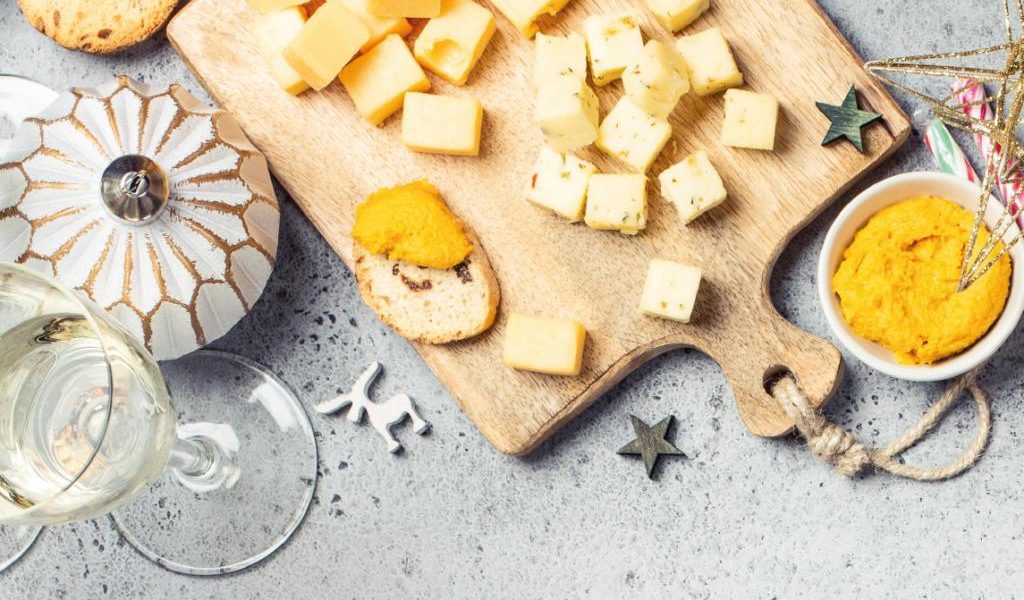It’s hard to think of a holiday more decadent than Christmas. With limited edition mince pies and speciality yule logs, it can often feel like you have a finite amount of time to make the most of the festivities, and the food that comes with it. But at what point do you start eating for the sake of eating? “During the festive season we’re presented with a whole host of tempting indulgences,” says nutritionist Emma Brown from Nutracheck (nutracheck.co.uk). “But overdoing it can lead to you feeling sluggish, guilty and gaining unnecessary weight.” When practised correctly, mindful eating has been shown to aid weight loss and boost digestion, in addition to helping us enjoy our food more. Here are some easy techniques we can use to help us get started over the Christmas period.
Eat normally
While it may be tempting to decline the full English so you can leave room for the turkey dinner, you’re probably not doing yourself a favour in the long run. If you’re ravenous when you sit down to eat, you’re less likely to register what you’re actually putting in your mouth. “Mindful eating means being more aware of our hunger cues and when we feel full,” says Emma. “It means paying attention to our food choices and how this impacts our body in terms of nutritional benefit.” So what’s the best thing to do? If you’re hungry in the morning, make sure you grab breakfast, but if you’re not, there’s nothing wrong with skipping it either.
Downsize your portion
Eyes often bigger than your stomach? That probably means you need to try eating smaller meals. “Habit plays a huge part in how much we eat,” says Emma. “If we grew up being served big portions, the chances are we still try and eat everything that’s on our plate. If our childhood experience was eating meals of modest portions, it’s likely we’ll still have smaller-sized meals. Either way, our perception of what is a ‘decent’ serving differs. Start with what you perceive to be a smaller portion and take your time. This will allow you to tune into your hunger and satiety cues.”
Prep from scratch
With plenty of pre-prepared food readily available in the supermarket, you can make Christmas cooking as time-efficient as you like. However, there’s a lot to be said for making your meals from scratch. “If you plan a menu for the week, then you’re in a position to take a few hours out to batch cook a couple of recipes and get ahead,” says nutritional therapist Beanie Robinson (thehealth-space.com). “Reducing the amount of processed and packaged food we consume and making things from scratch at home, will mean you pay more attention to what you’re eating and the individual ingredients in your meals.” You’re much less likely to overeat if you nourish yourself with wholesome food, so if you’re looking for a reason to try and cook some new festive dishes, this is it!
Try smaller plates
If, like many of us, you struggle with self-control at a buffet, then it might be a good idea to opt for a smaller plate before you hit the queue. “Filling your plate with a huge serving will simply encourage you to finish it all, even if that means that you become uncomfortably full,” says Emma. “Try using smaller plates or bowls, pause every two to three mouthfuls, put your cutlery down and have a sip of water – this can slow down your eating and encourage you to savour each bite fully.”
Take a breather
Ever sat in front of the TV and demolished a whole box of chocolates by the end of the programme? You’re definitely not on your own there, but before you reach for that next Turkish delight, try putting the lid on and set the box aside. “The time that’s frequently quoted for our stomach to register that it’s full is 20 minutes, but this varies from person to person and with what you eat, so it could take less or more time,” says Emma. “Generally speaking, it does take our brain a little while to register what we’ve consumed, so it’s a good idea to try and take your time over meals and have a break between courses. Many of us find that we crave something sweet after finishing our dinner, but if you wait 15-20 minutes, the chances are that the urge will have passed.”
Focus on feeling good
One of the benefits of mindful eating is that you rarely feel sluggish or lethargic after you finish a meal. “The Christmas period is about winding down and enjoying your time off, so slowing down your eating can help you really appreciate your food,” says Beanie. “Simple everyday actions, such as staying well hydrated, getting enough sleep, keeping our bodies moving and mindfully drinking, are ways of nourishing our bodies to help us make healthier, more mindful choices over the Christmas period. Before refilling your plate ask yourself, ‘am I eating because my body is still hungry? And, ‘how will I feel afterwards?’”
Have what you want
Ever heard of the phrase ‘a little bit of what you fancy does you good’? Incorporating more mindful principles into your life will help you understand how your cravings work. You should feel that you can happily have a slice of Christmas cake, but that you don’t have to keep eating it once you’re full. “Being mindful in December should help you appreciate all the wonderful flavours of the season and encourage you to make healthier choices,” says Emma. “You don’t have to deprive yourself of anything that you want.”
Engage fully
As a nation, we love to multi-task, but sitting down and being present while we eat is more important than you might think. “Come away from the TV or your laptop and simply enjoy your food,” says Beanie. “Mindless eating tends to happen when we are engaged in other activities because our focus is not on the food or how our bodies are feeling, but on the task at hand. This is a recipe for overeating.” An easy and simple way to prevent mindless snacking is to remove distractions and avoid eating on the go. “Make it a rule to only eat when sitting down,” says Emma. “Rather than grabbing a few sausage rolls on your way to your afternoon meeting, grab one and place it on your desk for later. You’ll enjoy it more then.”
Start before christmas
Don’t kick off your commitment to eating mindfully on Christmas day itself – practising it in the run-up to the big day will make it a lot easier for you to see where you might be lacking mindfulness in your eating habits. “A simple way to increase our awareness of what we’re putting in our mouths is to keep a food diary for a couple of weeks,” says Beanie. “Writing down exactly what you’ve eaten and what you’ve been drinking, can bring to light any habits that may not be serving your mind and body. Having gained a new insight, you’re then in a position to start addressing negative eating behaviours and introducing more positive food choices.”
Don’t beat yourself up
At the end of the day, Christmas isn’t supposed to be a time of deprivation, so if you find that you have piled your plate up too high and are now feeling a tad bloated, don’t fall into the trap of berating yourself. “The festive period is tricky for even the most disciplined of people,” says Beanie. “If we can learn to show self-compassion and cut ourselves some slack, we can begin to internally forgive ourselves for those indulgent moments. By moving forward with self-love, we can feel empowered to prevent the same situation happening again.”




















